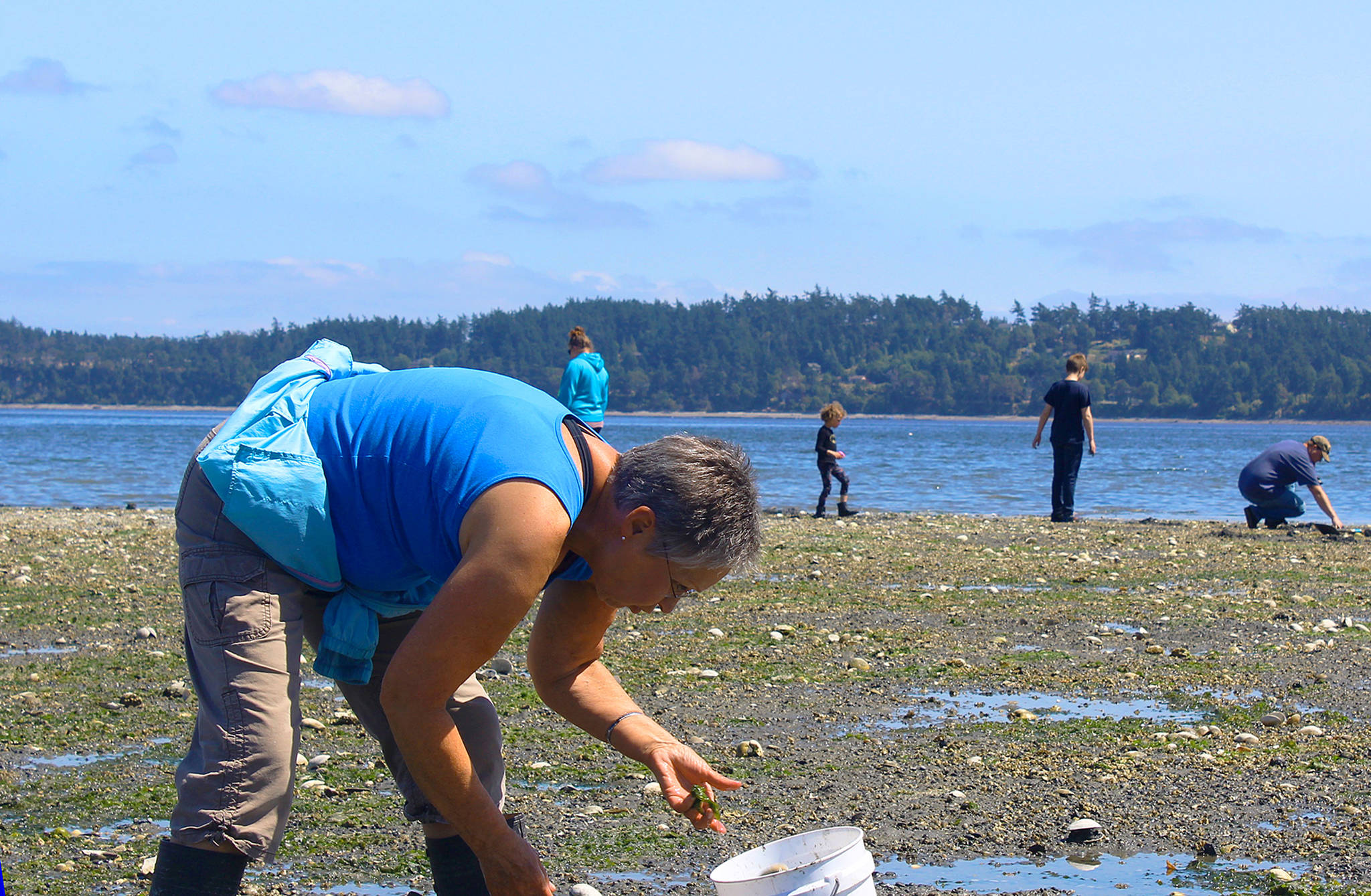Someday soon, some crabs are going to be thanking Don Robinson and Becky Cormier for a tantalizing tasty tidbit.
The pair mucked about at west Penn Cove beach recently, shovel in hand and eyes peeled for little squirts of water indicating a clam somewhere down below.
“Crabs love clams,” declared Robinson of Coupeville. “They eat ‘em up. I don’t eat them. They gross my wife out. ‘As long as you feed them to the crabs, I’m good.’ That’s what she tells me. So I take them crabbing.”
Cormier planned the same fate for half the haul of butter clams she stored in buckets. She carefully counted to ensure she didn’t exceed the daily legal limit of 40 clams not weighing more than a total of 10 pounds. Each clam should be at least an inch and a half in size.
Some would end up in crab pots, she said. Others were bound to meet up with some Bisquick, eggs, butter, onions and bacon crumbs, be dropped by the spoonful in a sizzling frying pan and become “really yummy clam fritters.”
Cormier, who lives nearby off West Beach Road, said she often digs for her dinner — or breakfast.
“I was here yesterday and a couple days before that, I had friends over from Olympia so I bring them out here, get some clams and eat them fresh.”
For the first time, the popular Penn Cove beach was closed by the state for shellfish harvesting from Jan. 1-June 1 to allow butter clams and other shellfish to rebound from overharvesting.
The impacted area, from the Capt. Whidbey Inn to Grassers Lagoon, gets a a flurry of activity during extreme low tides, which just occurred in late June.
With the summer season of clamming, crabbing and clamoring about Whidbey beaches underway, Mari-beth Crandell, shellfish coordinator for Island County Public Health, offered a few safety tips.
“In general, it’s wise not to harvest shellfish anywhere where there may be poor water quality, like a marina, waste water treatment plant, near stormwater outfall pipes,” she said. Also, where there’s dense development, there could also be leaking septic systems, pet wastes or other pollution entering the water.
Penn Cove has a waste water treatment plant in Coupeville and another on the north side, at Monroe Landing.
“Anything west of those outfall pipes is marked ‘conditionally approved,’ meaning as long as the treatment plants are operating as they should, it’s fine,” Crandell said.
“If there is a problem with either treatment plant, shellfish harvesting will be closed immediately.”
A county park at Holmes Harbor is closed because of harmful bacteria that builds on that beach throughout the summer due to wind direction, topography and a thick layer of beach grass, known as wrack.
“We have the thickest beach wrack build up in Puget Sound at Freeland County Park,” Crandell said. “The wind changes direction in the winter and blows the wrack off the beach so the shellfish harvest season will open again in the early spring.”
She also gave the usual warning of discarding shellfish that doesn’t open when steamed or cooked.
Hot weather can cause shellfish, primarily oysters, to grow vibrio which is a type of bacteria that can cause food poisoning. Should someone get sick after eating shellfish, a call to the health department is warranted so others can be warned, Crandell said.
Crandell encourages people to refer to the Shellfish Safety Map on the county website before harvesting. The interactive map lets people zoom in on beaches.
Crabbing season runs through Sept. 4; harvesting is allowed Thursday-Monday.
Generally, island beaches are open to clam and oyster harvesting year-round but can close for health and safety concerns.
“Biotoxins like paralytic shellfish poison can make you sick or even kill you, so always check the Safe Shellfish Map before you go harvest shellfish,” Crandell said.
“In really hot weather, put shellfish on ice immediately. Cook them thoroughly and then throw out the ones that don’t open.”
Vibrio is destroyed by cooking shellfish to an internal temperature of 145 degrees for 15 seconds.
Safety tips
• For beach closures or warnings, check the state’s website, the Shellfish Safety Map; or call the shellfish hotline, 1-800-562-5632.
• Harvest shellfish as soon as possible with the receding tide.
• Don’t harvest shellfish that have been exposed to the sun for more than one hour (less in really hot weather).
• Keep shellfish cold after harvesting.
• Eat only well-cooked shellfish, especially in summer months. Do not consider shellfish to be fully cooked when the shells just open; they need to cook longer to reach 145 degrees.



